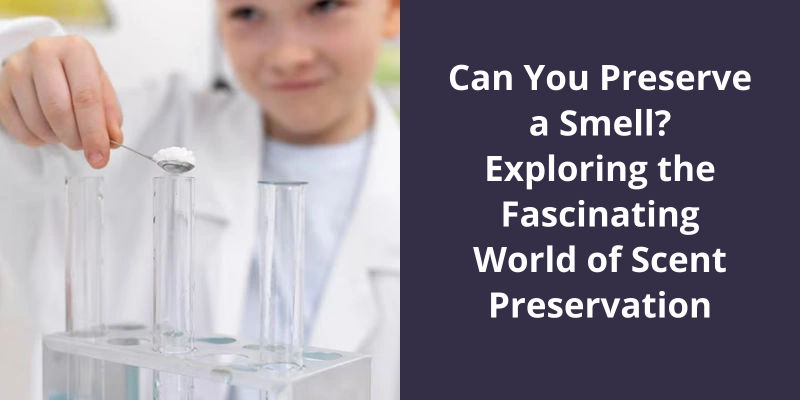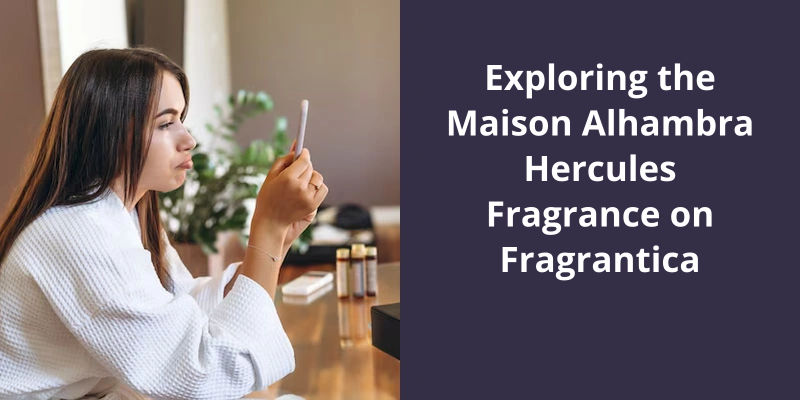Yes, you can preserve a smell. The process of preserving scents revolves around capturing volatile organic compounds, which are the particles that we detect as odors. Mostly used in the fragrance industry, the method involves using a device known as a scent capture machine. This machine pulls in the air from a specific environment, filters it, and holds onto the scent particles. The captured scent can then be analyzed and replicated using a mixture of aroma compounds. Still, although science allows us to capture, analyze and recreate some smells, it’s a complex process and not all scents can be perfectly preserved or recreated. Our ability to perceive and interpret smells also varies greatly among individuals, adding another layer of complexity to scent preservation.

Can You Preserve a Smell on Clothing?
Another key to preserving a scent on clothing is to avoid washing the item too frequently. Frequent washing can strip away the scent and leave clothing smelling neutral or even unpleasant. Consider spot cleaning and airing out clothing instead of washing it after each wear. If you must wash the item, try using a gentle, unscented detergent to avoid overpowering or conflicting scents.
These can be applied directly to the clothing, either before or after wearing, to refresh and enhance the scent. Be sure to test any new spray or oil on a small area of the clothing first to avoid staining or discoloration.
In addition to storage and fragrance products, choosing the right type of fabric can also help preserve a scent on clothing. Natural fabrics such as cotton, silk, and wool tend to hold scents better than synthetic fabrics like polyester.
Finally, consider the power of memory and association in preserving a scent on clothing. Our brains are wired to associate scents with memories and experiences, so wearing the same item of clothing with a particular scent repeatedly can help cement that scent in our minds. This can be especially effective with scents that hold a strong emotional connection, such as those associated with loved ones, special occasions, or favorite places.
Storing the item in an airtight container, avoiding frequent washing, using fragrance products, choosing high-quality fabrics, and leveraging the power of memory and association can all help keep scents fresh and long-lasting. With a little mindfulness and care, you can enjoy your favorite scents on your clothes for longer.
How to Preserve the Scent of Vintage or Sentimental Clothing
- Store clothing in a sealed container with a lavender sachet or cedar block.
- Avoid direct sunlight and damp areas.
- Avoid using scented products such as perfumes or dryer sheets.
- Consider using a professional clothing preservation service.
- Avoid washing too frequently and use a gentle detergent.
- If possible, hang clothing outside to air out before storing.
- Use specialized products such as anti-microbial sprays or natural odor absorbers.
- Consider using a vacuum-sealed bag for long-term storage.
Although vinegar, baking soda, commercial sanitizers, and sports detergents can successfully remove most odors from your fabrics, some stubborn smells require a more advanced solution. Luckily, there are a few highly effective methods for tackling even the most difficult odors, and we will explore them in detail in the following sections.
What Absorbs Odor From Fabric?
However, sometimes these methods don’t quite do the trick, and lingering odors can still remain. So what can be done when these methods fail? The answer lies in activated charcoal. Activated charcoal has been used for centuries to purify water and filter toxins, and it can also be used to absorb unpleasant odors from fabric.
It works by adsorbing odor molecules onto it’s surface, trapping them within it’s porous structure. This process effectively removes the source of the odor, leaving fabrics smelling fresh and clean.
One of the great things about using activated charcoal for odor removal is that it’s a natural, non-toxic substance. It’s also easy to use – simply place a small bag or sachet of activated charcoal in with your laundry or place it in a closet or drawers to absorb any musty odors. Many companies now make activated charcoal-based odor absorbers specifically for use on fabrics.
Another option for removing odors from fabrics is using ozone. Ozone is a gas that’s highly effective in neutralizing and removing odors. Ozone generators work by producing ozone, which is then circulated in the space where the odor problem exists. However, it’s important to note that ozone generators should only be used in unoccupied spaces, as ozone can be harmful to humans and animals in high concentrations.
In addition to activated charcoal and ozone, there are a variety of other odor-eliminating products on the market, such as sprays and deodorizers. These products work by masking or neutralizing odors rather than absorbing them, and are usually best used for short-term odor issues.
Source: A Guide to Getting Strong Smells Out of Your Clothes
It’s frustrating when you can’t seem to get rid of a bad smell. Whether it’s from a spill, smoke, or food gone bad, the odor can linger for longer than we’d like. But just how long can a smell last? It turns out, porous materials like wood, carpet, and upholstery can hold onto those odor molecules for an extended period of time under certain conditions. So, let’s explore how long a smell can last and what you can do about it.
How Long Can a Smell Last?
One factor that contributes to how long a smell can last is the type of substance that caused the odor. Strong-smelling substances like gasoline or ammonia can linger for a long time, while other less pungent smells may dissipate more quickly. Additionally, the environment in which the odor is present can impact it’s longevity. A sealed, enclosed space may trap and prolong the odor, while an open, well-ventilated area may help the smell dissipate more quickly.
Another factor to consider is the type of material that the odor has attached itself to. Porous materials like wood and fabric are especially prone to holding onto smell molecules. These materials provide a space for the molecules to become trapped, making it more difficult for the odor to dissipate. In contrast, non-porous materials like glass or metal don’t provide a space for odor molecules to become trapped, so smells attached to these types of surfaces may dissipate more quickly.
The amount of time it takes for a smell to fade can also depend on how strong the original odor was. Additionally, if the source of the odor is still present, the smell will continue to linger until it’s removed or dissipated. This can include things like decaying food or mold growth, which may require professional cleaning to properly remove.
Moisture can help to activate and release odor molecules, making it more difficult for the smell to dissipate or be removed. This can be particularly problematic in areas like bathrooms or kitchens, where moisture is present on a regular basis.
While it may be difficult to completely eliminate some odors, diligent cleaning and proper ventilation can help to minimize their impact over time.
Health Risks Associated With Long-Term Exposure to Certain Odors
Long-term exposure to certain odors can pose health risks to individuals. Breathing in hazardous chemicals and pollutants from strong odors can lead to various respiratory, neurological, and other health issues. The dangers associated with long-term exposure to some chemicals include skin irritations, headaches, and respiratory problems. Therefore, it’s essential to safeguard one’s health by avoiding prolonged exposure to harmful odors.
Understanding how our sense of smell adapts to prolonged exposure to odours is an interesting phenomenon, but there’s so much more to learn about the complexities of our olfactory system. In this article, we will explore the latest research on how our sense of smell works, the effects of scent on our emotions and behavior, and the potential applications of scent technology in various industries. Let’s dive in.
Do Smells Just Go Away?
While adaptation to smells may seem like a harmless quirk, it can actually have some negative consequences. For instance, people who live or work in environments with pervasive odours may become desensitized to them, making it difficult to detect changes in the air quality or detect hazardous smells. Additionally, adaptation to unpleasant odours can lead to overuse of scented products, such as air fresheners or perfumes, which can be harmful to people with allergies or asthma.
Another interesting aspect of adaptation to smells is that it can be influenced by individual factors, such as age, gender, and genetics. For example, older people tend to have a reduced ability to detect smells, while women are generally more sensitive to odours than men.
While the concept of adaptation to smells has been around for centuries, it’s still not well-understood by scientists. Some theories suggest that the olfactory system becomes fatigued or overwhelmed by prolonged exposure to odours, while others propose that the brain actively suppresses certain smells in response to repeated exposure. Regardless of the mechanism, the fact remains that adaptation to smells is a complex and fascinating phenomenon.
One area where the concept of adaptation to smells is particularly relevant is in the perfume industry. Perfumers must constantly innovate and create new fragrances in order to maintain their appeal to consumers, who can quickly become desensitized to familiar scents. This is why many perfumes contain a variety of different notes, which can become more apparent over time as the wearer becomes adapted to the fragrance.
As our understanding of olfaction and scent perception continues to evolve, it will be interesting to see how our knowledge of adaptation to smells shapes the way we think about and interact with the world around us.
However, sometimes airing out a room for a day isn’t possible. In these cases, there are other methods you can try to eliminate the odor.
How Long Does It Take to Air Out a Smell?
However, the duration it takes to air out a smell depends on several factors, including the source of the odor, room size, ventilation, and temperature. If the smell is coming from a particular item or area, such as a piece of furniture, carpet, or a spill, you may need to focus on that area to remove the odor effectively. You can use some homemade remedies such as vinegar or baking soda to neutralize the odor.
Larger rooms with proper ventilation can air out smells faster than smaller spaces with limited ventilation. In addition, the temperature of the room can also play a role in how quickly the smell fades away. Warmer temperatures tend to promote the evaporation of the odor particles, which can make the odor more noticeable.
Additionally, the type of air freshener or deodorizer that you use can also impact how long it takes to remove the odor. Some air fresheners merely mask odors rather than eliminating them, which means the smell may linger longer. Therefore, it’s essential to choose the right product for the type of odor you’re dealing with.
Opening windows and doors is usually the first step in removing unwanted odors. Still, it may take longer than 24 hours, depending on the severity and type of odor. Homemade remedies, proper room temperature, and the use of the right deodorizer can also help speed up the process.
Proper storage of perfume is essential if you want to preserve it’s scent for a long time. It isn’t just about keeping the bottle closed until the first spritz, but there are several other factors that you need to consider. In this article, we will share everything you need to know about perfume storage to ensure that your favorite fragrances last longer.
How Do You Preserve a Smell for a Long Time?
Scents hold the power to evoke memories and emotions like nothing else. It’s no wonder we all have a favorite perfume or aroma that we hold dear. But the question arises, how does one preserve a smell for a long time so that it doesn’t lose it’s potency or freshness? Perfume storage is an art and taking care of your fragrance collection can be the key to making it last a long time.
The first rule of perfume storage is to keep the bottle closed until the first spritz. This is because exposure to air can cause the fragrance to oxidize and lose it’s potency. Oxidation is the process by which the scent molecules break down, causing the scent to go rancid.
Store your perfume in a dark place away from direct sunlight. Ultraviolet rays from sunlight can cause the fragrance to break down faster, leading to a change in scent and reduced quality. A dark drawer or shelf will protect the fragrance from light and keep it fresh for longer.
The next important factor to keep in mind is to store your fragrance in a dry place. Humidity can cause fragrances to break down and go bad, so it’s essential to keep away from moisture. If you live in a humid region, consider investing in a dehumidifier or keep your scents in an airtight container with a silica gel packet to absorb excess moisture.
Keep your perfume in the original box, if possible. Fragrance boxes are designed to protect perfumes from sunlight, humidity, and air exposure, making them an excellent option for storing fragrances. However, if you don’t have the original packaging, make sure to store your essence in a dark, dry, and cool place away from heat and moisture.
Finally, store scents on a low-level shelf. Heat rises, making the top shelf of a cabinet or closet the warmest, which can cause issues with fragrances deteriorating faster. Keeping scents on a lower level shelf protects the fragrance from rising heat, keeping it fresh for longer. And always remember to keep the bottle sealed when not in use.
Conclusion
Many people have strong connections to certain scents, whether it be a familiar perfume or the smell of homemade cookies. Preserving these scents isn’t only important for personal reasons, but also for the preservation of cultural heritage and history.





